Weight Loss Drugs vs. Bariatric Surgery – Which is Right For You?
If you’re trying to lose weight and finding it difficult, you may have considered taking medications or undergoing bariatric surgery. Both of these... read more
Call Us Today (732) 640-5316
E-Waiting Room
When we swallow, our food travels down the esophagus to the stomach. When the food enters the stomach, a valve or ring of muscle called the lower esophageal sphincter (LES) closes to keep the food in the stomach.
Heartburn is a burning sensation in your chest or abdomen caused by stomach acid moving into the esophagus. Heartburn often occurs when you eat spicy or acidic foods, fried or fatty foods, caffeine, and alcohol. Eating a large meal or eating before bedtime can worsen symptoms of heartburn. Smoking and obesity are some of the most prevalent risk factors associated with heartburn. More than 60 million Americans experience heartburn at least once a month. Heartburn can be treated with lifestyle changes and over-the-counter medications designed to decrease stomach acid production.
GERD is a chronic and often progressive disease where stomach acid, food, and bile back up into the esophagus due to a weak LES. The acid irritates the esophagus and causes heartburn.
Persistent heartburn symptoms occurring several times a week that do not fully resolve with over-the-counter medications and changes to your diet are considered to be GERD. In addition to heartburn, hallmarks of GERD include regurgitation and dysphagia, or a sensation that food is stuck in your esophagus.
GERD is a more serious condition that substantially impairs quality of life.
If untreated, GERD can cause complications, including inflammation of the esophagus, pain, and a disease called Barrett’s Esophagus (BE), where the esophagus lining erodes. BE can lead to esophageal cancer. BE is more common in white men, people older than 50, smokers, and obese people.
A laparoscopic Nissen Fundoplication (LNF) is a surgery where the top of the stomach is wrapped around the LES to reinforce the sphincter and reduce acid reflux. LNF is the gold standard surgical treatment for GERD. However, it is a longer and more invasive surgery which permanently alters the anatomy of the stomach, and is not easily reversible. Partial wraps or fundoplications can also be an effective treatment of GERD in some patients.
The LINX Reflux Management System is a surgical procedure that significantly improves the symptoms of GERD. LINX was designed to stop reflux at its source by restoring the body’s natural barrier, the Lower Esophageal Sphincter (LES). LINX is a small, flexible band composed of titanium beads with magnetic cores. The band is placed around the LES through a laparoscopic procedure. The magnets hold it shut, which stops stomach acid from breaking the seal. However, the magnetic force is still weak enough that swallowing can loosen it before it reconnects. This allows food and other necessities to enter the stomach and continue natural bodily function.
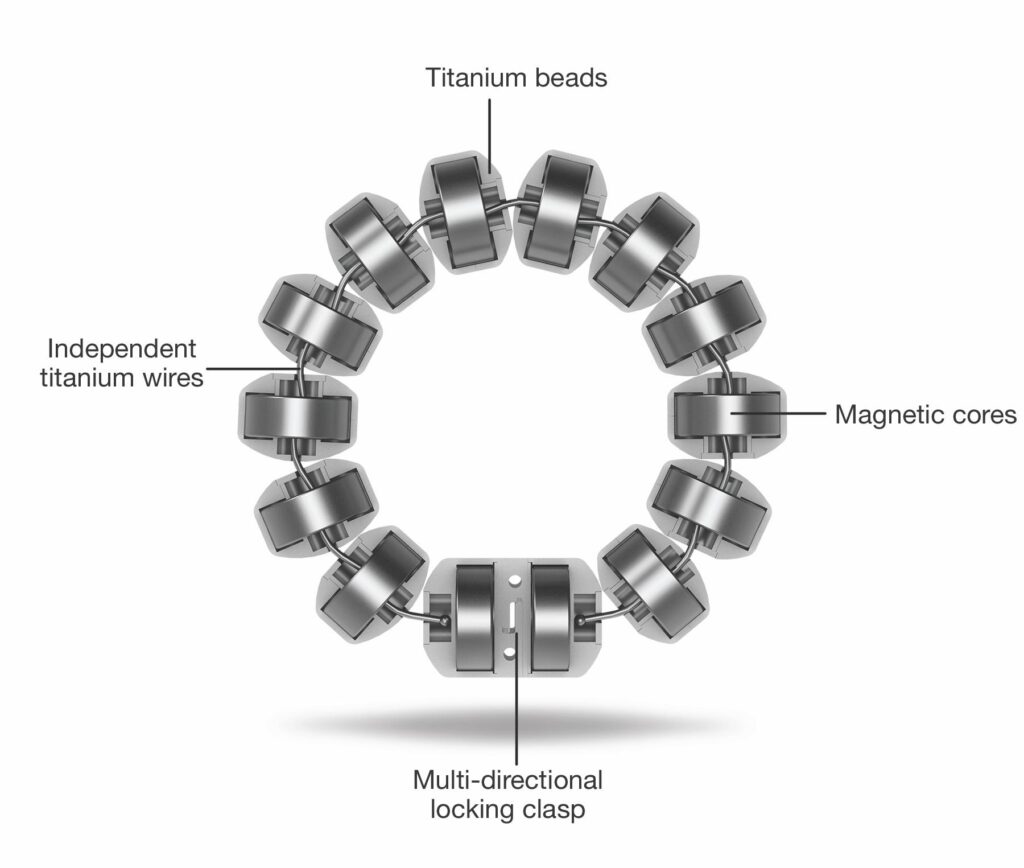
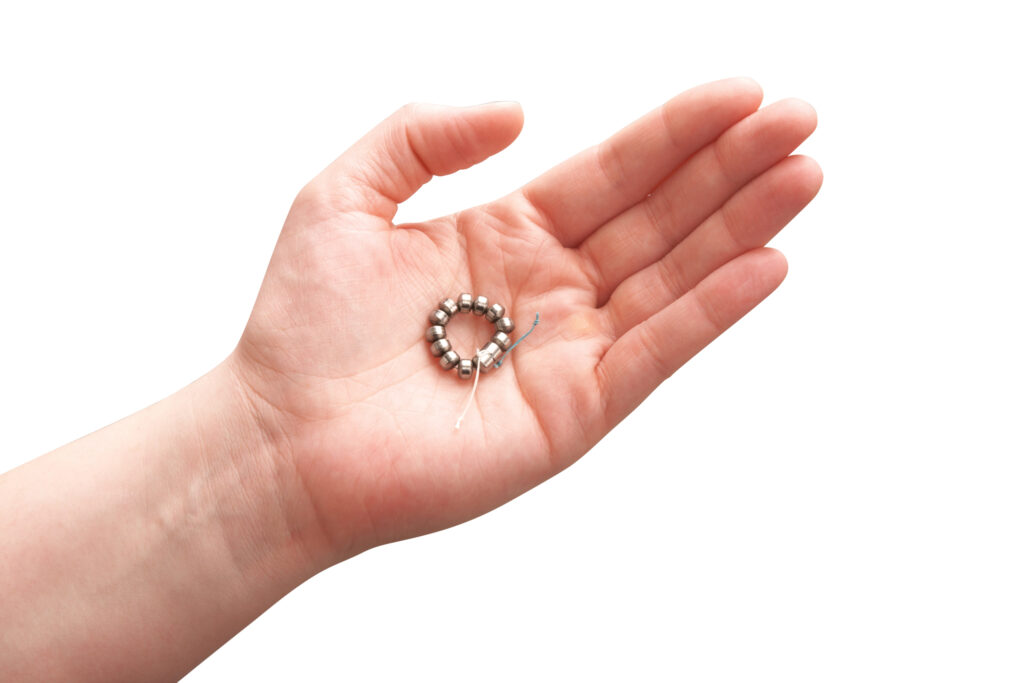
The magnet ring keeps the LES closed to prevent reflux but is flexible to allow swallowing. When you swallow, the beads open to allow food and liquids to pass into the stomach and close immediately after swallowing to prevent reflux. It is useful for mild, moderate, and severe GERD treatment.
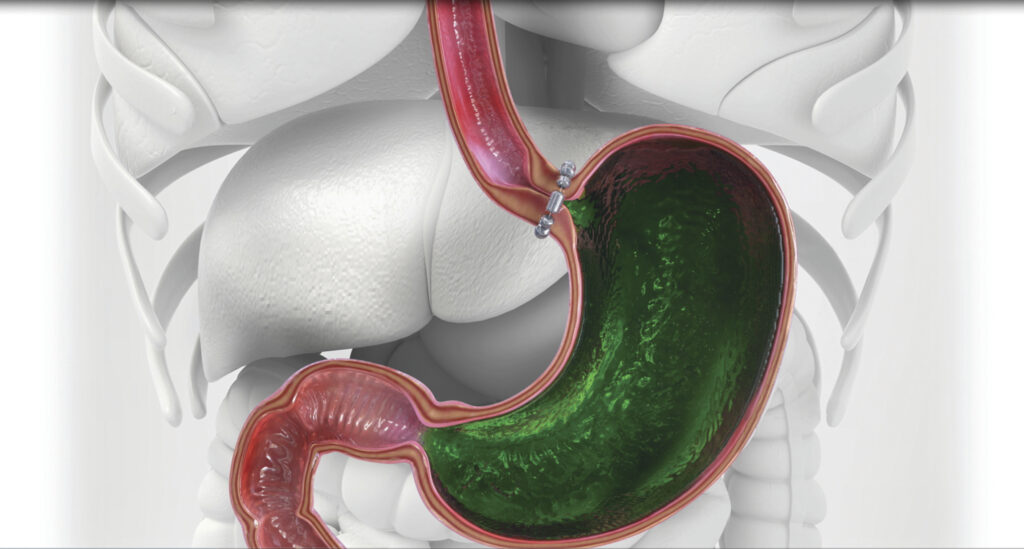
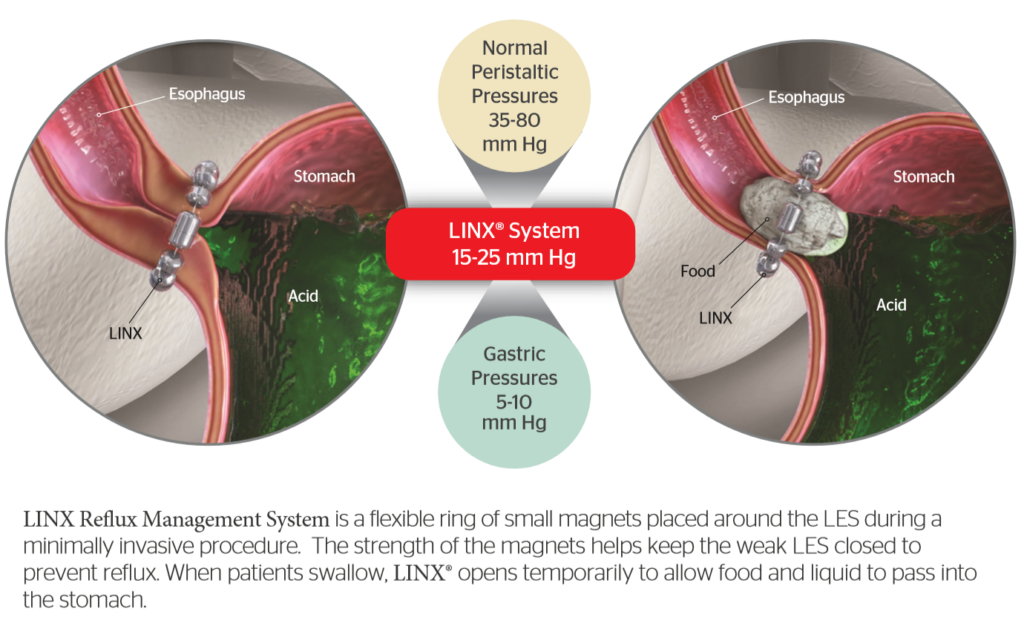
For the implant process, the patient is placed under general anesthesia. The surgeon uses a sizing tool to determine which LINX system should be implanted. Then, the band is placed around the LES by suture tails, and the surgeon connects the ends securely.
LINX is a simple, standardized laparoscopic procedure that does not alter gastric anatomy, provides relief of reflux-related symptoms without impeding the ability to burp or vomit, and is reversible if necessary. It is a shorter surgery, with reduced side effects and less need for reoperation. Most patients can return home the same day as the surgery.
Advanced Surgical and Bariatrics of New Jersey is pleased to offer our patients the LINX procedure. It can help you return to a normal lifestyle, reduce or eliminate GERD and its symptoms, eliminate the need for medications, and you can return to a normal diet.
Absolutely amazing from start to finish! Drs are completely top notch! Nurse Jaclyn Taglia is absolutely exquisite! Takes her own personal time to help u! Completely goes out of her way and makes u feel so comfortable with her reassurance and knowledge! She is so great to have by your side through this! Wonderful support! Thank you!
Roseann P.To determine if you are a suitable candidate for LINX®, our doctor will perform an endoscopy, a pH test, or an esophageal motility study to verify how severe your GERD is. A thorough physical evaluation will also be performed to assess your overall health. Before you undergo a LINX procedure, our specialist will inform you of all the preparatory steps required for a successful surgical treatment. These will include:
You will typically leave the hospital the same day as surgery. You will require 3 to 4 weeks to recover after your LINX® procedure. To avoid postoperative complications, certain self-care guidelines are necessary to follow, including:
Several follow-up appointments with our surgical specialist will be required after the procedure to monitor your diet and recovery. During your visits, our doctor will also perform a status check on your LINX® device.
Advanced Surgical and Bariatrics of New Jersey has offices in Somerset, Marlboro, East Brunswick, and Edison, Hamilton, Toms River, Belleville, and Jersey City, serving the New York and New Jersey area. All patients receive state-of-the-art care with cutting-edge techniques, including laparoscopic (minimally invasive) and robotic bariatric surgical techniques. Contact us to find out if you are a good candidate for LINX.

Dr. Ragui Sadek is a premier surgeon who established a state-of-the-art and one of the safest bariatric surgery programs in the state. Dr. Sadek has fellowship training in both laparoscopic/bariatric surgery and surgical trauma/critical care, allowing him to safely perform complex surgeries on patients who have been turned down by other practices. As a Clinical Assistant Professor of surgery at RWJ Medical School & the Director of bariatric surgery program at RWJ University Hospital, Dr. Sadek offers a cutting-edge range of laparoscopic, robotic, & bariatric surgical procedures with a complication rate substantially below the national average.
Dr. Sadek is a Clinical Assistant Professor of Surgery at Rutgers-Robert Wood Johnson Medical School and a Fellow of the American College of Surgeons. Having performed more than three thousand advanced surgical procedures, Dr. Sadek has established a strong patient satisfaction rate and a solid reputation among the surgical community and is renowned as a top physician in his field by International Association of Healthcare Professionals. As a board-certified surgeon, he holds affiliations with the American Society of Metabolic and Bariatric Surgery and the Society of American Gastro Endoscopic Surgeons. More about Dr. Sadek
Stay current with Advanced Surgical & Bariatrics of New Jersey
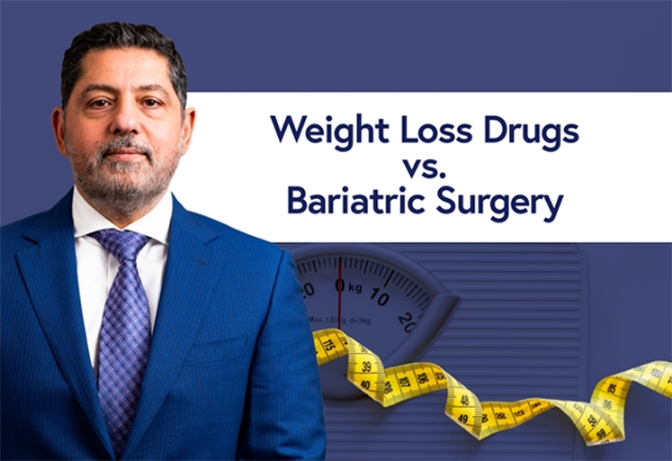
If you’re trying to lose weight and finding it difficult, you may have considered taking medications or undergoing bariatric surgery. Both of these... read more

Are you frustrated with your inability to lose weight? Tired of being trapped in an endless cycle of yo-yo dieting, over-exercising, cleanses, and... read more